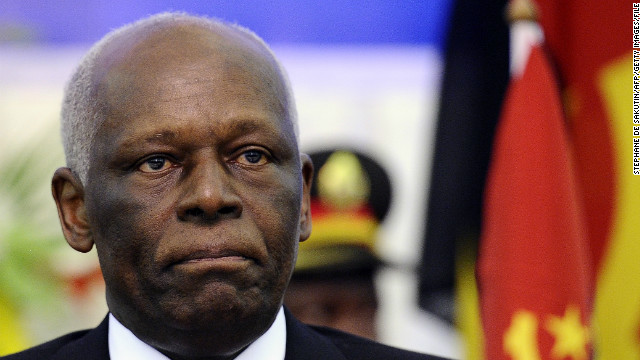Angola matters to U.S. So what’s the problem?
By Alex
Vines, Special to CNN
 |
| Angolan President, José Eduardo dos Santos |
Twenty years ago this Sunday, the United States belatedly recognized Angola. Today, Angola is the second-largest trading partner of the U.S. in sub-Saharan Africa, a country at peace and enjoying one of the fastest rates of economic growth in the world. It is the second largest producer of oil in sub-Saharan Africa and an OPEC member that has allowed major U.S. oil companies to prosper. But all is not well in the relationship.
Angola achieved independence from Portugal in 1975 and immediately became a major battle ground of the Cold War. The U.S. refused to recognize the pro-Soviet and Cuban backed MPLA government, encouraged apartheid South African military incursions and trained and supplied the rebel UNITA forces. At one point, Angola became the second largest recipient of U.S. covert aid after the Afghan Mujahedeen.
Fast forward to today, and the MPLA is still the ruling party, with President José Eduardo dos Santos having been in power since 1979. And, despite the many global suitors, dos Santos said recently that Angola has only four strategic partners: Brazil, China, Portugal and the United States.
China’s relationship with the country is blossoming – more than 258,000 Chinese received work visas for Angola in 2011. Portugal does well, too, with more than 100,000 nationals working in Angola; one in five liters of exported Portuguese wine is now consumed in Angola. Trade and cultural ties with Brazil, meanwhile, are very close and the South American giant was the first country to establish diplomatic relations with Luanda, in 1975.
But what of the United States? There was certainly a honeymoon period after President Clinton recognized Angola. U.S. oil companies prospered, including negotiating a multiple entry visa regime for U.S. workers to Angola, a privilege that few other countries have emulated. In 1994, Clinton also successfully obtained dos Santos’ agreement to sign up to the short-lived Lusaka peace accords with UNITA. President George W. Bush likewise was able to push successfully for transparency of oil rents when he met dos Santos at the White House.
More from GPS: Can U.S. firms 'get' Africa?
The Obama administration has for its part identified three “strategic partners” on the African continent: South Africa, Nigeria and Angola. After Angola was identified as a partner in 2009, a U.S.-Angola Strategic Partnership Dialogue has been set up. So what’s the problem?
In practice, the dialogue has achieved little and the government-to-government relationship today is prickly and pedestrian – so much so that at the last moment the Angolan foreign minister reportedly postponed a trip to the United States scheduled for this month that was meant to celebrate the 20th anniversary of U.S.-Angola relations.
Two key issues seem to be at the root of the problems. First, with a changing global order, Angola’s policy makers enjoy choice and have become less-enamored with the United States as other suitors have stepped in. Second, Angola represents a major challenge for U.S. diplomats and business as it throws up the challenge of U.S. values versus interests. This January, Forbes named Isabel, the eldest daughter of President dos Santos, Africa’s first female billionaire. Not long after, Transparency International ranked Angola 168th out of 178 countries in its corruption perception index.
The reality is that the perception of corruption and rent-seeking is a barrier for U.S. investors, and despite the best efforts of the U.S. Embassy in Luanda and the U.S.-Angola Chamber of Commerce in Washington DC, the last couple of years have been tough, not helped by U.S. probes into the bank accounts of Angolan diplomatic missions, or the seizure of a U.S. flagged ship and crew in Angola.
Yet Angola is not all that dissimilar to some other African markets that U.S. companies invest in, and the United States has much to offer Angola – in business, skills transfer and know how – all of which could help Angola become the regional power it aspires to be. Angola’s opposition parties also see how important the U.S. is, underscored by the visit to Washington recently of the leader of UNITA; the leader of Angola’s newest successful opposition party, CASA, is about to visit Washington.
Angola’s strategic partnerships are a four legged stool, but the U.S. leg is undoubtedly the weakest. Some major U.S. companies are investing in Angola: General Electric for example has recently invested some $2 billion in health and infrastructure. But increased U.S. investment to Angola will require greater openness because requirements such as the Dodd-Frank rule requiring that oil companies disclose payments to foreign governments won’t be going away.
Angola is an emerging African regional power of genuine commercial, political and strategic importance to the U.S. The 20th anniversary of relations between the two countries might be a good opportunity to take an honest look at how the partnership can best work for both.

0 comentários:
Enviar um comentário